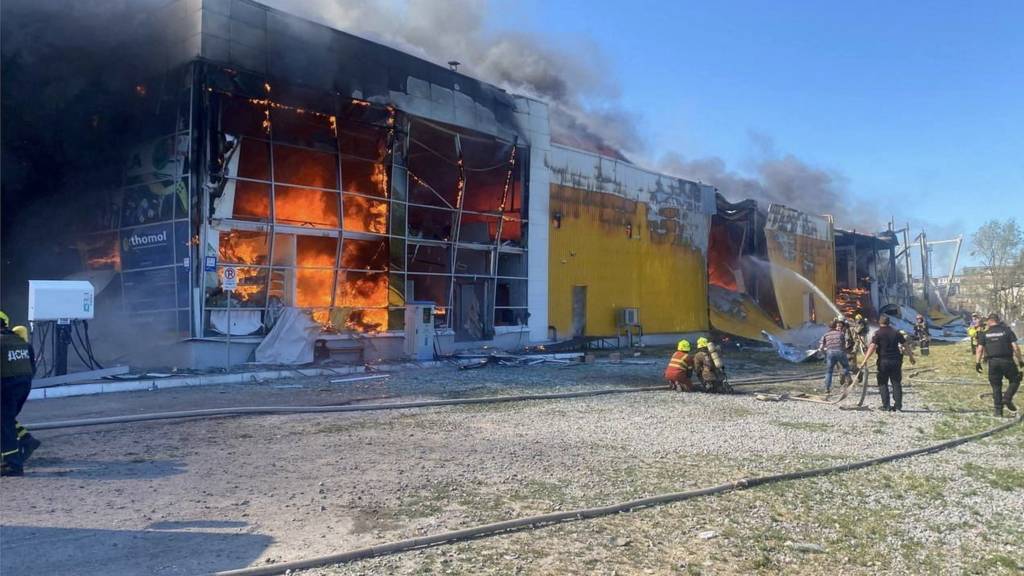
Crowded shopping centre hit by Russian strike - 13 dead
Updates from BBC correspondents: Jenny Hill and James Landale in Bavaria, Joe Inwood, Sophie Williams and Nick Beake in Kyiv, Jonathan Beale in Donbas, and Steve Rosenberg in Moscow
Related Video and Audio
RTL
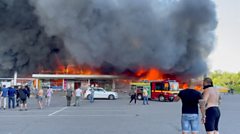
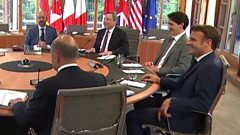

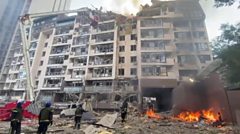
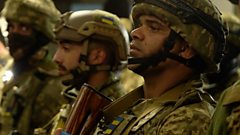

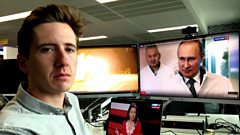
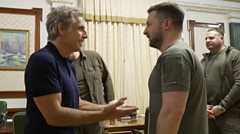
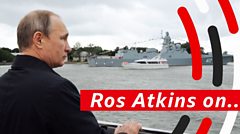
Live Reporting
Edited by Chris Giles
All times stated are UK
Get involved
Russia has committed a war crime - Ukrainian official
Russia has committed a war crime by carrying out a missile on a shopping centre in the city of Kremenchuk in Ukraine's Poltava region, regional head Dmytro Lunin says.
Writing on Telegram, he said the number of people who've been killed and wounded in the attack still isn't clear as the shopping centre is still in flames.
According to a deputy head of the presidential office, Kyrylo Tymoshenko, two people have been confirmed to have died and 20 have been injured. Nine of them are in critical condition, he says.
What do we know about Kremenchuk?
As we've been reporting, missile strikes have hit a busy shopping centre in the town of Kremenchuk in the Poltava region in Ukraine.
At least two people have been confirmed dead, and 20 injured, according to the deputy head of the office of the president. President Zelensky estimates that 1,000 people were in the mall at the time of the strike.
Here's what we know about the town:
This is not the first time the city is hit by Russian missiles. Earlier on in the war, Russian missiles hit Kremenchuk's oil refinery and other infrastructure facilities.
At the time Poltava's governor, Dmytro Lunin, said the oil refinery had been "completely destroyed" after the attack.
According to Ukraine's 2021 census, Kremenchuk has a population of 217,710. Its one of Ukraine's largest industrial cities.
The town sits on the Dnieper River, which is one of the main borderline rivers in Ukraine.
Number of dead and injured in Kremenchuk expected to rise significantly
Nick Beake
Reporting from Kyiv
The number of people killed or injured in the missile strike on a crowded shopping centre in the city of Kremenchuk in central Ukraine is expected to rise significantly.
At present, two people are confirmed dead, with 20 known to be injured - nine seriously.
A huge fire is raging inside the shopping mall, verifed pictures show - with reports emerging of video showing people who are purportedly trapped inside.
A number of emergency services are on site trying to rescue those who were caught up in the strike. President Zelensky estimates around 1,000 people were inside at the time.
The city's mayor has called the attack "another Russian war crime, a crime against humanity - an open and cynical act of terror against the civilian population".
It is not the first time the city has been hit by missiles - with one strike recorded in April and another 10 days ago at a nearby oil refinery, but nothing on the scale of today's attack.
Given the timing, during the G7 summit in Bavaria where world leaders have met to discuss their ongoing response to the Russian invasion of Ukraine, it could be interpreted as a message from President Putin.
Fire rages at shopping mall after missile strike
Rockets struck the shopping mall at about 15:50 local time, say officials in Kremenchuk.
Fire soon broke out at the site, covering a 10,000 sq m area.
The full death toll is still not known, but two people are already confirmed to have died, with 20 others injured.
We'll bring you the latest updates as they come in.
WATCH: Footage shows collapsing building on fire
Video content
At least two people have been confirmed dead and 20 injured in a missile strike at a crowded retail area in Kremenchuk in the Poltava region of Ukraine.
President Zelensky posted this footage on his social media showing a badly damaged, collapsing building on fire.
The Ukrainian president said Russia carried out the missile strike while more than 1,000 people were in the building.
BreakingAt least two dead, 20 injured
At least two people have been confirmed dead and 20 injured in the attack on the shopping mall, according to Kyrylo Tymoshenko, deputy head of the office of the president.
Zelensky says people 'living normal lives' as shopping centre struck
Ukrainian President Volodymyr Zelensky has said the strike on a shopping mall in Kremenchuk has "no strategic value" to Russian forces.
Zelensky said Russia carried out a missile strike at a crowded retail area while more than 1,000 people were in the building.
Footage from the site shows the badly damaged, collapsing building ablaze, and fire crews struggling to contain the flames.
"The occupiers have hit a shopping centre with over a thousand civilians inside," Zelensky said on Telegram.
"It is on fire, and rescue workers are trying to put out the fire, the number of victims is impossible to imagine."
"It posed no threat to the Russian army. No strategic value. People only wanted to live a normal life, which is what angers the occupiers so much.
"Out of helplessness, Russia continues to hit ordinary people. It is vain to expect it to be reasonable or humane."
Unknown number of dead and wounded in attack on 'very crowded' site
More now on the missile strike in the central Ukrainian city of Kremenchuk.
The city's mayor, Vitaliy Meletskiy, said in a post on Facebook that the strike hit a "very crowded" place.
He said he was at the scene but did not say what had been hit and how many people had been killed or wounded.
The country's President Volodymyr Zelensky subsequently said that over 1,000 people were in the shopping mall at the time of the strike and that a fire is raging.
We'll be bringing you updates on this breaking story as we have them.
BreakingMissile strikes busy shopping centre
Sophie Williams
Reporting from Kyiv
A rocket has hit a shopping mall in the town of Kremenchuk in the Poltava region of Ukraine.
Images from the scene show the site completely ablaze.
According to reports, a number of people are feared dead and injured.
President Zelensky said on Telegram that 1,000 people were in the mall at the time of the strike.
The mall posed "no danger to the Russian army" and posed "no strategic value" to the Russians, he said.
Moldovan president 'speechless' at destruction outside Kyiv
The president of Moldova has described the destruction of the suburbs of Kyiv as an "unimaginable tragedy".
On a visit to Ukraine's capital, President Maia Sandu has visited the war-torn outskirts of the city, including the towns of Borodyanka, Bucha and Irpin "to see with her own eyes the consequences of the Russian occupation of Ukrainian territories", the head of the Kyiv regional military administration, Oleksiy Kuleba, says on Telegram.
The Moldovan president "was left speechless by the level of violence and destruction", Kuleba says.
"It's an unimaginable tragedy & we wholeheartedly wish the brave selfless Ukrainian people peace, freedom & prosperity, & life of their own choosing," Sandu has tweeted.
Nato plans to boost quick reaction force a sign of uncertain times
Katya Adler
Europe Editor, reporting from Madrid
The announcement of Nato's plans to increase the number of its forces "at high readiness" represents a massive boost for its quick reaction force - from 40,000 to over 300,000 troops.
It's also a clear sign of the insecure times the defence alliance faces following Russia’s invasion of Ukraine.
Jens Stoltenberg, Nato's Secretary General, has promised this week’s meeting will be transformative, including the biggest overhaul of collective deterrence and defence since the Cold War.
Nato members located closest to Russia, especially the Baltic states of Estonia, Latvia and Lithuania, but also Poland and recent Nato applicants Finland and Sweden, feel particularly exposed.
They’re expecting a dramatic upgrade in Nato's eastern defences, which would include fellow members such as the UK, US and France pledging warplanes and ships to be at the ready.
World cannot cope with multiple famines - World Food Programme
More than 345 million people around the world are facing "acute levels of food insecurity" as the war in Ukraine heads into a fifth month, says the World Food Programme (WFP).
The ongoing war, combined with rising global fuel prices and the fallout of the Covid pandemic, has significantly raised the imminent threat of famine around the world.
Much of Ukraine's highly valued grain exports are in danger of rotting in local warehouses as the Russians continue their blockade of Ukraine's ports on the Black Sea.
The situation is further exacerbated by sanctions on exports of Russian fertliser, which is likely to heavily impact food production going forward.
"We are extraordinarily concerned. We are facing the triple F crisis: food, fuel and fertiliser," Matthew Hollingworth, Emergency Coordinator for the WFP in Ukraine tells the BBC.
"Next year... we might not only have a food access problem, but a food availability problem as well," he says - as countries, which already cannot afford to import food, struggle to produce their own crops without fertiliser.
"I would hope that common sense could prevail and recognise that the human cost of this war goes far beyond the borders of Ukraine," he says. "There has to be an understanding that globally the world cannot cope with multiple famines in 2022 and 2023.
"The human cost is too great," he adds.
Who are the main players at the G7 summit?
As we've been reporting, G7 leaders are meeting for the annual summit in Germany this week where Ukraine is the main issue up for discussion.
But you may have noticed that there are more than just the seven leaders of industrialised nations at meetings.
Also attending are two representatives from the EU: President of the European Commission Ursula von der Leyen and European Council President Charles Michel.
The graphic below shows the key figures at the summit in Bavaria:
G7 in show of solidarity - but tough decisions lie ahead
Jenny Hill
Reporting from the G7 summit in Germany
World leaders have gone out of their way to put on a show of solidarity.
The strongly worded statement they issued today suggests they genuinely are united in their conviction that there is only one way forward.
The declaration negates suggestions that some of those G7 leaders were starting to waver in their support for Ukraine.
The war is, after all, exacerbating a cost of living crisis which is hurting their voters. It also – for now at least – appears to dismiss the controversial claim, put forward by analysts and politicians worldwide, that the war could end if Ukraine hands over territory taken by Russian troops to Vladimir Putin in exchange for peace.
The leaders state that Ukraine, and Ukraine alone, will determine its future, without external pressure.
But the ongoing support will come at a price, which is why the G7 is also focusing on attempts to alleviate the impact on global food and energy supplies.
And it’s why they’re trying to intensify pressure on Vladimir Putin, discussing new sanctions aimed at cutting off the sources of revenue paying for his war.
But as the German chancellor Olaf Scholz tweeted earlier, tough but necessary decisions lie ahead. Because, given the Russian leader’s intransigence to date, their latest demand he withdraw his troops immediately and unconditionally is extremely unlikely to be met.
Johnson blames Russian invasion for cost of living 'aftershocks'
UK Prime Minister Boris Johnson says the Russian invasion of Ukraine has had a knock-on effect on cost of living increases across the globe.
In a tweet, Johnson, who is at the G7 summit, says the actions of Russian President Vladamir Putin in Ukraine "are creating terrible aftershocks, driving up energy and food prices across the world".
"Global leaders need to come together to help Ukraine and make life easier for households across the world. Nothing should be off the table," he says.
An earlier statement from Downing Street called for an end to "Putin's stranglehold on grain" and pledged the UK's commitment to end Russia's blockage by repairing railways.
Figures from Ukraine's agriculture ministry earlier show grain exports in the first 22 days of June fell by about 44% from a year earlier, to 1.11 million tonnes.
'People are trying to return to some form of normality'
Sophie Williams
Reporting from Kyiv
This was the scene yesterday in Kyiv after the morning's missile strike.
Here in Kyiv, although the city is a lot quieter than usual, people are trying to return to some form of normality.
Yesterday evening, people were out enjoying the last of the sun before heading home in time for the 23.00 curfew.
But even as I write this, the air raid sirens sound, reminding the city that Ukraine is still at war with Russia.
Kyiv strikes: Russia claims Ukrainian missile hit block of flats
Chris Partridge
BBC News
Russia claims the missile that struck an apartment block in Sunday’s attack on Kyiv was actually a Ukrainian missile which hit it by mistake.
Russia’s defence ministry says it fired what it called four "high-precision" air-launched missiles, targeting a factory producing munitions for Ukrainian Multiple Launch Rocket Systems. And it claims all four hit that target.
In the attack, a residential block was struck, killing at least one person. But Russia alleges it was not hit by one of its missiles.
"The Kyiv regime attempted to intercept Russian high-precision missiles by the means of air defence deployed in the city. Ukrainian S-300 and Buk-M1 air defence system crews had launched over 10 air defence missiles,” Russia’s MoD says in a statement.
"Due to the lack of interoperability between the launching ramps of the air defence systems and the electronic facilities deployed in residential areas, two S-300 air defence missiles have been intercepted by Ukrainian Buk systems.
"One of the intercepted air defence missiles has presumably fallen down [on] to a residential building."
Ukraine says the Russian missiles were launched from Tupolev bombers over the Caspian Sea, some 900 miles (1,450km) from Kyiv.
There has been no immediate response from Ukraine to the latest Russian claims - but they are likely to be very strongly denied.
Wimbledon starts with stars missing because of the war
The war in Ukraine has affected many aspects of life around the world - and Wimbledon, which starts today, is one of them.
The famous tennis tournament takes place this year with no Russian or Belarussian players, following a decision by the All England Club, which stages the championships, to exclude them.
"We recognise that this is hard on the individuals affected, and it is with sadness that they will suffer for the actions of the leaders of the Russian regime," club chairman Ian Hewitt said.
The ATP and WTA, which run the men's and women's tours respectively, reacted to the ban by stripping this year's Wimbledon of its ranking points.
The ban means no place in the championship for the men's world number one player Daniil Medvedev, nor his fellow Russian, world number eight Andrey Rublev. On the women's side, the biggest name ruled out by the ban is Belarus's Aryna Sabalenka, ranked sixth in the world.
Ironically Medvedev stands to benefit from the decisions, in terms of the world rankings, at least. Because those players who are taking part won't be able to gain ranking points at Wimbledon but will also lose the points they gained in last year's tournament (because the ranking system takes into account points earned over a 12-month period), Medvedev is likely to see his lead at the top of the list grow.
So why has the ban been imposed? Wimbledon has said it imposed the ban to "limit Russia's global influence" as per UK government policy, but the ATP says this undermines its principle that all players can "enter tournaments based on merit, and without discrimination".
But it's been reported that a key consideration was concern that if a Russian or Belarusian player won Wimbledon they would have to be congratulated and presented with a trophy by a member of the British Royal Family.
Nato to massively expand quick response force
Nato is increasing the number of troops available to its response force from 40,000 to 300,000, the military alliance's secretary general announces.
"We will strengthen our forward defences. We will enhance our battle groups in the eastern part of the alliance, up to brigade levels. We will transform the Nato response force and increase the number of our high readiness forces to well over 300,000," Jens Stoltenberg tells reporters in Madrid ahead of a summit there this week.
He describes Russia as as the most significant and direct threat to the alliance's security and values and the Nato response to the invasion of Ukraine as the biggest overhaul of its collective defence and deterrence since the Cold War.
What's happened so far today?
If you're just joining us, here are the latest developments on the war in Ukraine as the G7 meets today: